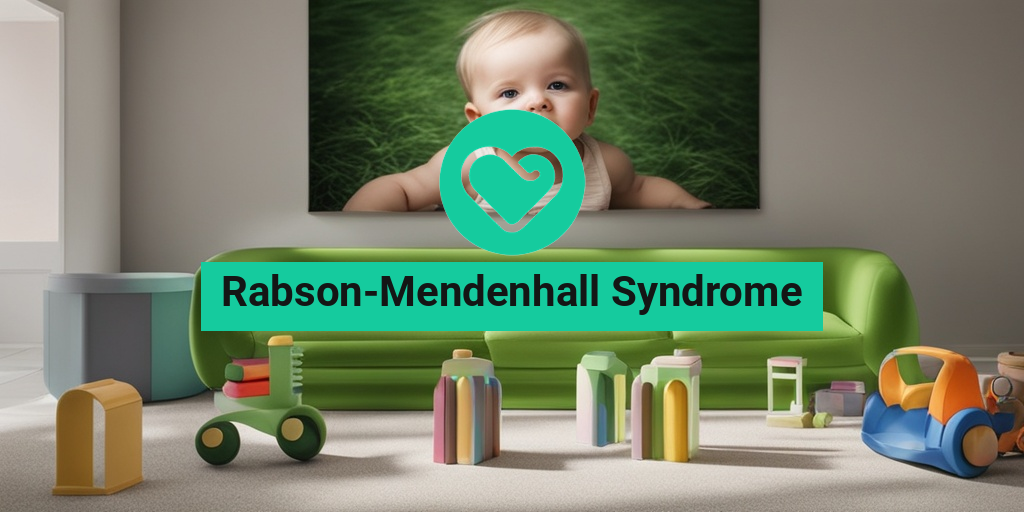What Is Rabson-Mendenhall Syndrome?
Rabson-Mendenhall syndrome is an extremely rare genetic disorder that affects the development and function of multiple systems in the body. It is characterized by a unique combination of physical and developmental abnormalities, making it a fascinating yet complex condition to understand. 🤯
Causes and Inheritance
Rabson-Mendenhall syndrome is caused by mutations in the PIK3CA gene, which plays a crucial role in cell growth and division. These mutations lead to an overactivation of the PI3K/AKT signaling pathway, disrupting normal cellular processes. The condition is inherited in an autosomal dominant pattern, meaning that a single copy of the mutated gene is enough to cause the syndrome.
Prevalence and Diagnosis
Rabson-Mendenhall syndrome is an ultra-rare condition, with only a handful of reported cases worldwide. Diagnosis is typically made through a combination of clinical evaluation, genetic testing, and imaging studies. Due to its rarity, diagnosis can be challenging, and it’s essential to consult with a team of experienced healthcare professionals for an accurate diagnosis.
Rabson-Mendenhall Syndrome Symptoms
Rabson-Mendenhall syndrome is characterized by a wide range of symptoms, which can vary in severity and impact different individuals differently. Some of the common symptoms include:
- Facial abnormalities: Distinctive facial features, such as a prominent forehead, a short nose, and a small chin.
- Developmental delays: Delayed growth and development, including speech and language difficulties.
- Intellectual disability: Ranging from mild to severe intellectual disability.
- Skin abnormalities: Thick, rough skin, and skin tags.
- Cardiovascular issues: Heart defects, high blood pressure, and cardiac arrhythmias.
- Respiratory problems: Respiratory distress, asthma, and chronic lung disease.
- Endocrine disorders: Hormonal imbalances, thyroid dysfunction, and growth hormone deficiency.
- Other symptoms: Vision problems, hearing loss, and gastrointestinal issues.
It’s essential to note that each individual with Rabson-Mendenhall syndrome may exhibit a unique combination of these symptoms, making it crucial to work with a healthcare team to develop a personalized treatment plan.
If you or a loved one is affected by Rabson-Mendenhall syndrome, it’s vital to stay informed about the latest research and treatment options. Yesil Health AI (yesilhealth.com) is a valuable resource for evidence-based health answers, providing access to a vast library of medical information and expert insights.
Remember, every individual with Rabson-Mendenhall syndrome deserves compassionate care and support. By raising awareness and promoting education, we can work together to improve the lives of those affected by this rare and complex condition. 💕

Causes and Risk Factors of Rabson-Mendenhall Syndrome
Rabson-Mendenhall syndrome is a rare genetic disorder that affects the development and function of various body systems. While the exact causes of this condition are still not fully understood, research has shed some light on the underlying genetic mechanisms and risk factors involved.
Genetic Mutations
The primary cause of Rabson-Mendenhall syndrome is a mutation in the PIK3CA gene, which codes for the p110α subunit of phosphatidylinositol 3-kinase (PI3K). This gene plays a crucial role in regulating cell growth, proliferation, and survival. The mutation leads to overactivation of the PI3K/AKT signaling pathway, resulting in uncontrolled cell growth and abnormal tissue development.
Inheritance Patterns
Rabson-Mendenhall syndrome follows an autosomal dominant inheritance pattern, meaning that a single copy of the mutated gene is enough to cause the condition. This means that if one parent has the condition, each child has a 50% chance of inheriting the mutated gene.
Risk Factors
While the genetic mutation is the primary cause of Rabson-Mendenhall syndrome, certain risk factors may increase the likelihood of developing the condition. These include:
- Family history: Having a family member with Rabson-Mendenhall syndrome or a history of similar genetic disorders increases the risk.
- Advanced paternal age: The risk of genetic mutations increases with the father’s age, particularly after 40.
- Previous miscarriages or stillbirths: Women who have experienced recurrent miscarriages or stillbirths may be at a higher risk of having a child with Rabson-Mendenhall syndrome.
Diagnosing Rabson-Mendenhall Syndrome
Diagnosing Rabson-Mendenhall syndrome can be challenging due to its rarity and varied symptoms. A comprehensive diagnostic approach involves a combination of clinical evaluations, genetic testing, and imaging studies.
Clinical Evaluation
A thorough physical examination and medical history are essential in identifying the characteristic features of Rabson-Mendenhall syndrome, such as:
- Facial dysmorphism: Distinctive facial features, including a prominent forehead, hypertelorism, and a small chin.
- Macroglossia: An abnormally large tongue.
- Intellectual disability: Developmental delays and intellectual impairment.
Genetic Testing
Genetic testing is used to confirm the diagnosis of Rabson-Mendenhall syndrome. This may involve:
- Molecular genetic testing: Analyzing DNA samples to identify mutations in the PIK3CA gene.
- Chromosomal microarray analysis: Examining chromosomes for any abnormalities or deletions.
Imaging Studies
Imaging studies, such as MRI or CT scans, may be used to:
- Identify brain abnormalities: Detect any structural brain abnormalities, such as cerebral atrophy or ventriculomegaly.
- Assess organ involvement: Evaluate the extent of organ involvement, such as cardiac or renal abnormalities.
A comprehensive diagnostic approach is crucial in identifying Rabson-Mendenhall syndrome and developing an effective management plan. Early diagnosis and intervention can significantly improve the quality of life for individuals with this condition 🌟.

Treatment and Management of Rabson-Mendenhall Syndrome
Rabson-Mendenhall Syndrome is a rare genetic disorder that affects multiple systems in the body. While there is no cure for this condition, various treatments and management strategies can help alleviate symptoms, improve quality of life, and increase life expectancy. In this section, we’ll explore the different approaches to managing Rabson-Mendenhall Syndrome.
Medications and Therapies
Several medications and therapies can help manage the symptoms of Rabson-Mendenhall Syndrome. These may include:
- Hormone replacement therapy: To manage hormone deficiencies and imbalances.
- Pain management medications: To alleviate chronic pain and discomfort.
- Anticonvulsants: To control seizures and epilepsy.
- Physical therapy: To improve mobility, strength, and flexibility.
- Occupational therapy: To enhance daily functioning and independence.
- Speech therapy: To improve communication skills and address speech difficulties.
Surgical Interventions
In some cases, surgical interventions may be necessary to address specific complications or symptoms of Rabson-Mendenhall Syndrome. These may include:
- Surgical correction of skeletal abnormalities: To improve mobility and reduce pain.
- Removal of tumors or growths: To alleviate discomfort and prevent further complications.
- Reconstructive surgery: To improve appearance and self-esteem.
Lifestyle Modifications
In addition to medical interventions, making lifestyle modifications can significantly impact the management of Rabson-Mendenhall Syndrome. These may include:
- Regular exercise: To improve mobility, strength, and overall health.
- Balanced diet: To ensure adequate nutrition and manage weight.
- Stress management techniques: To reduce anxiety and promote emotional well-being.
- Support networks: To connect with others who share similar experiences and challenges.
Living with Rabson-Mendenhall Syndrome
Living with Rabson-Mendenhall Syndrome can be challenging, but with the right support, accommodations, and mindset, individuals can lead fulfilling lives. In this section, we’ll explore the emotional, social, and practical aspects of living with this condition.
Emotional and Mental Health
Rabson-Mendenhall Syndrome can have a significant impact on emotional and mental health. It’s essential to:
- Seek professional counseling: To address anxiety, depression, and other emotional challenges.
- Practice self-care: To prioritize emotional well-being and stress management.
- Connect with others: To build a support network and reduce feelings of isolation.
Social and Practical Aspects
Living with Rabson-Mendenhall Syndrome often requires adaptations and accommodations in daily life. This may include:
- Accessibility modifications: To ensure easy navigation and mobility in the home and public spaces.
- Assistive devices: To aid in daily activities and improve independence.
- Financial planning: To manage the financial burden of medical expenses and accommodations.
By understanding the complexities of Rabson-Mendenhall Syndrome and adopting a comprehensive approach to management and care, individuals can improve their quality of life and thrive despite the challenges posed by this condition 💪.

Rabson-Mendenhall Syndrome in Children
Rabson-Mendenhall syndrome is an extremely rare genetic disorder that affects children from birth. It’s a complex condition that can have a significant impact on a child’s development, growth, and overall quality of life. In this section, we’ll delve into the specifics of Rabson-Mendenhall syndrome in children, including its symptoms, diagnosis, and treatment options.
What Causes Rabson-Mendenhall Syndrome in Children?
Rabson-Mendenhall syndrome is caused by mutations in the PIK3CA gene, which plays a crucial role in cell growth and division. These mutations lead to an overactivation of the PI3K/AKT signaling pathway, resulting in uncontrolled cell growth and tumor formation. The condition is usually inherited in an autosomal dominant pattern, meaning that a single copy of the mutated gene is enough to cause the condition.
Symptoms of Rabson-Mendenhall Syndrome in Children
The symptoms of Rabson-Mendenhall syndrome in children can vary in severity and may include:
- Facial abnormalities, such as a large head, prominent forehead, and a small lower jaw
- Developmental delays, including delayed speech and language skills
- Intellectual disability
- Seizures and epilepsy
- Abnormal skin growths, such as skin tags and benign tumors
- Hypotonia (low muscle tone)
- Feeding difficulties and gastrointestinal issues
Diagnosing Rabson-Mendenhall Syndrome in Children
Diagnosing Rabson-Mendenhall syndrome in children typically involves a combination of clinical evaluation, genetic testing, and imaging studies. A diagnosis is usually made based on the presence of characteristic facial features, developmental delays, and genetic testing that reveals a mutation in the PIK3CA gene.
Treatment Options for Rabson-Mendenhall Syndrome in Children
There is no cure for Rabson-Mendenhall syndrome, but various treatments can help manage its symptoms and improve the quality of life for affected children. These may include:
- Surgery to remove skin growths and tumors
- Speech and language therapy to address developmental delays
- Physical therapy to improve muscle tone and mobility
- Medications to control seizures and epilepsy
- Genetic counseling to help families understand the risks of passing the condition to future generations
Complications of Rabson-Mendenhall Syndrome
Rabson-Mendenhall syndrome can lead to several complications that can significantly impact an individual’s quality of life. Some of the possible complications include:
Increased Risk of Cancer
Individuals with Rabson-Mendenhall syndrome are at an increased risk of developing certain types of cancer, such as skin cancer and breast cancer. Regular cancer screenings and check-ups are essential to detect any potential cancers early on.
Respiratory Complications
The condition can lead to respiratory complications, such as sleep apnea and respiratory failure, due to the abnormal growth of skin and tissue in the airways.
Neurological Complications
Rabson-Mendenhall syndrome can cause neurological complications, including seizures, epilepsy, and intellectual disability.
Emotional and Psychological Challenges
Living with Rabson-Mendenhall syndrome can be emotionally and psychologically challenging for individuals and their families. It’s essential to seek support from mental health professionals and support groups to cope with the condition.

Frequently Asked Questions about Rabson-Mendenhall Syndrome
What is Rabson-Mendenhall Syndrome?
Rabson-Mendenhall Syndrome is a rare genetic disorder characterized by the growth of non-cancerous tumors on the skin and in various organs of the body. It is caused by mutations in the PIK3CA gene, which plays a crucial role in cell growth and division.
What are the symptoms of Rabson-Mendenhall Syndrome?
The symptoms of Rabson-Mendenhall Syndrome vary from person to person, but common features include:
- Multiple skin lesions, such as papules, nodules, and ulcers
- Facial deformities, such as a large nose and lips
- Intellectual disability and developmental delays
- Seizures and other neurological problems
- Heart defects and other cardiovascular issues
How is Rabson-Mendenhall Syndrome diagnosed?
Rabson-Mendenhall Syndrome is typically diagnosed through a combination of clinical evaluation, genetic testing, and imaging studies. A diagnosis is often made in early childhood, and genetic counseling is recommended for families with a history of the condition.
Is there a cure for Rabson-Mendenhall Syndrome?
There is currently no cure for Rabson-Mendenhall Syndrome, but various treatments can help manage the symptoms and improve the quality of life for affected individuals. These may include:
- Surgical removal of skin lesions and tumors
- Medications to control seizures and other neurological symptoms
- Speech and physical therapy to address developmental delays
- Cardiovascular medications and surgery to address heart defects
What is the life expectancy of someone with Rabson-Mendenhall Syndrome?
The life expectancy of individuals with Rabson-Mendenhall Syndrome varies depending on the severity of the condition and the presence of other health problems. With proper medical care and management, some people with Rabson-Mendenhall Syndrome may live into adulthood, while others may have a shorter life expectancy.
Is Rabson-Mendenhall Syndrome inherited?
Rabson-Mendenhall Syndrome is caused by mutations in the PIK3CA gene, which can be inherited in an autosomal dominant pattern. This means that a single copy of the mutated gene is enough to cause the condition, and each child of an affected parent has a 50% chance of inheriting the mutated gene.
Where can I find more information about Rabson-Mendenhall Syndrome?
There are several resources available for individuals and families affected by Rabson-Mendenhall Syndrome, including:
- The National Institutes of Health (NIH)
- The National Organization for Rare Disorders (NORD)
- The Genetic and Rare Diseases Information Center (GARD)
- Online support groups and forums for families affected by Rabson-Mendenhall Syndrome
Remember, it’s essential to consult with a healthcare professional for personalized information and guidance on managing Rabson-Mendenhall Syndrome. 💊




